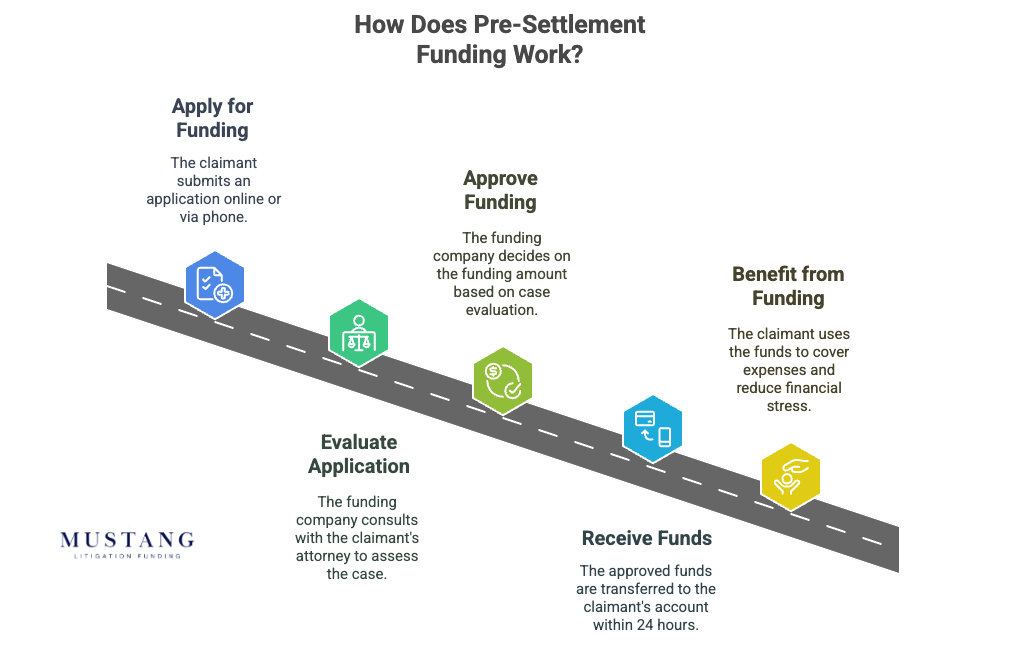A serious injury sets your life back in so many ways. If your injury resulted from another party’s negligence or recklessness, you could file a personal injury lawsuit to receive compensation.
Keep in mind that even the strongest personal injury cases can take months or years to settle. In the meantime, your medical bills continue piling up, and you must put food on the table, keep the utilities turned on, and pay your rent or mortgage.
Insurance companies know that if they drag a settlement out long enough, you might agree to a lesser amount due to desperation.
This is where pre-settlement funding in Pennsylvania can help. Although pre-settlement funding is often referred to as a lawsuit loan, it is not actually a loan. Pre-settlement funding works more like a cash advance. It does not affect your credit score, and your pending lawsuit acts as collateral.
The money from pre-settlement funding allows you to pay off bills and feel less stressed about your financial situation. You can generally receive up to 20 percent of an anticipated settlement amount.
There are no limitations when it comes to how you spend pre-settlement funding.
Is Pre-Settlement Funding Considered a Loan?
No, pre-settlement funding is not a loan. While we occasionally use the term “lawsuit loan”—since it’s a common search phrase—what we offer is technically different.
Pre-settlement funding is a non-recourse cash advance provided in exchange for a portion of your potential future settlement. Unlike a traditional loan, you are not required to repay the advance if you lose your case. In essence, we assume the risk. You receive funds upfront, and if your case is successful, we collect an agreed-upon share of your settlement.
Who Is Eligible for Pre-Settlement Funding in Pennsylvania?

To be eligible for pre-settlement funding in Pennsylvania, plaintiffs must have the following:
- A pending lawsuit: You must be a plaintiff in a pending civil legal action for pre-settlement funding. While lawsuit funding most often applies to personal injury claims, other case types may also be eligible, such as workers’ compensation, employment law, and mass torts.
- A strong case: A strong personal injury case is one where clear evidence establishes that the defendant’s negligence directly caused the plaintiff’s injuries, resulting in measurable damages. A strong case is also backed by compelling documentation, such as photographs of the accident scene, witness statements, surveillance footage, and detailed medical records.
- An attorney: Your attorney’s cooperation is integral to the process of pre-settlement funding. They will work with our team to determine the strength of your case. When your case is resolved, your lawyer will be responsible for disbursing funds to the appropriate parties, such as medical liens and related fees, attorney and court fees, and pre-settlement funding advances.
What Are the Benefits of Pre-Settlement Funding?
Whether your case is pending in Philadelphia, Pittsburgh, Allentown, or anywhere in the Commonwealth of Pennsylvania, the benefits of pre-settlement funding include the following:
A Fast Cash Advance
After consulting with your attorney, we will base our final decision on whether we believe you will win compensation and how much you are likely to receive. If you have provided complete contact information for your attorney, we could have an answer for you in as little as 24 hours.
Litigation Funding is Risk-Free
Some people turn to personal loans, credit cards, or even borrowing from family members to get by financially while waiting for their case to settle. These funding options come with potential risks, especially if your case doesn’t end in your favor. Pre-settlement funding takes the risk out of the equation because you pay it back only if your case resolves favorably.
Leverage
Accessing cash quickly is good news for plaintiffs who feel pressured to settle their cases quickly for bills and other expenses. A rushed settlement often means less compensation than what you might have received if you gave your case more time to settle the right way by allowing your attorney to negotiate for the best possible terms.
No Monthly Payments
Unlike credit cards and personal loans, litigation advances do not have monthly payments. Instead, these funds are only repaid once your case is completed. In addition, good credit is not a requirement for pre-settlement funding and applying for a lawsuit advance won’t affect your credit score.
How Pre-Settlement Funding Works in Pennsylvania
Only those who have a current personal injury case filed in civil court are eligible for pre-settlement funding in Pennsylvania.
Your lawyer must agree to work with us, as lenders must know the strength of the case before agreeing to pre-settlement funding. Under Pennsylvania law, your attorney must inform you that working with a lender will cause some loss in attorney-client privilege. That is because some confidential information must be shared with a third party.
Pre-settlement funding in Pennsylvania is non-recourse. That means that if the jury does not reach a favorable verdict in your case or the insurance company does not settle, you do not have to pay the funding back. That is a risk assumed by the lender.
Pennsylvania Pre-Settlement Funding Laws

In Pennsylvania, the statute of limitations for filing a personal injury lawsuit is generally two years from the accident date. Failing to file a lawsuit within that timeframe means your case cannot go forward.
If the accident involved a public entity, a notice of an intent to sue requires filing within six months.
Pennsylvania operates under a modified comparative negligence standard when it comes to liability. A plaintiff can bear up to 50 percent of fault and still recover damages. If they are determined by a jury to be 51 percent at fault, they cannot receive compensation.
Any award is reduced by their percentage of fault. For example, if a plaintiff is found to be 20 percent at fault by the jury, a $100,000 award is reduced to $80,000.
FAQs About Pre-Settlement Funding in Pennsylvania
Is Pre-settlement funding a loan?
Sometimes, pre-settlement funding is referred to as a pre-settlement loan. However, you are not borrowing money from our firm or anyone else for that matter. You receive a payout in advance for a future court award or settlement for a pending case. If you do not win your case, you do not repay these funds.
Is the information I provide on my pre-settlement funding application kept confidential?
Yes. We handle your personal information and the details of your legal proceedings with the utmost discretion. Since our founding, we have funded more than $120 million and issued funds to more than 10,000 individuals and firms. This extensive portfolio would never be possible if we weren’t trustworthy and professional.
What happens if my case settles for less than the pre-settlement funding amount?
If your case settles for less than expected, you are not responsible for covering that gap. We consider this risk when reviewing your application and offering you a lawsuit advance.
Learn More About Pre-Settlement Funding in Pennsylvania
If you would like to know more about pre-settlement funding in Pennsylvania and how it can help you, contact Mustang Funding today. If approved, you may receive your funding in as little as 24 hours.
We serve Philadelphia, Pittsburgh, Allentown, Erie, Scranton, and areas throughout the state.


